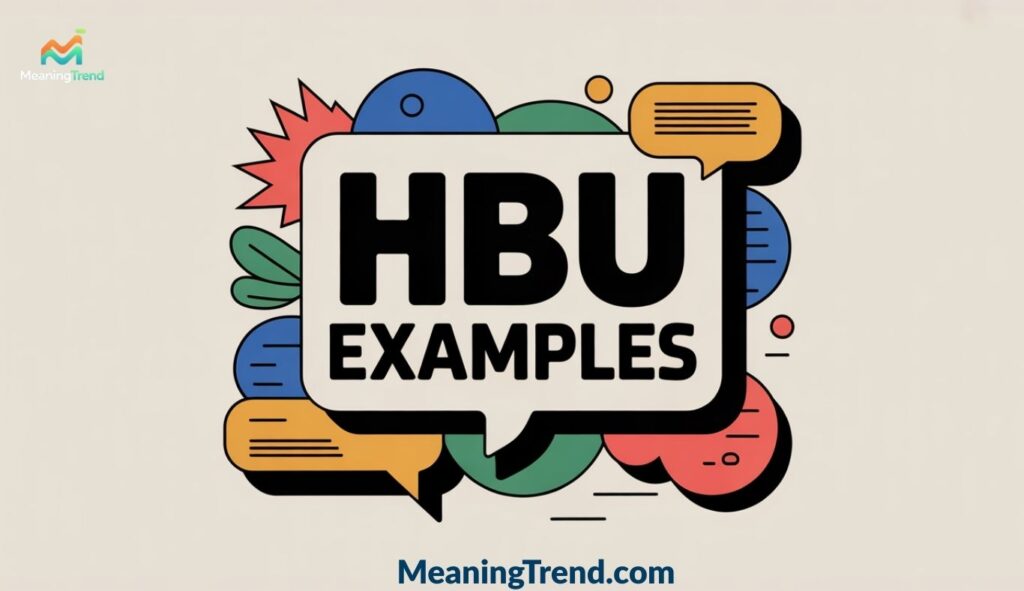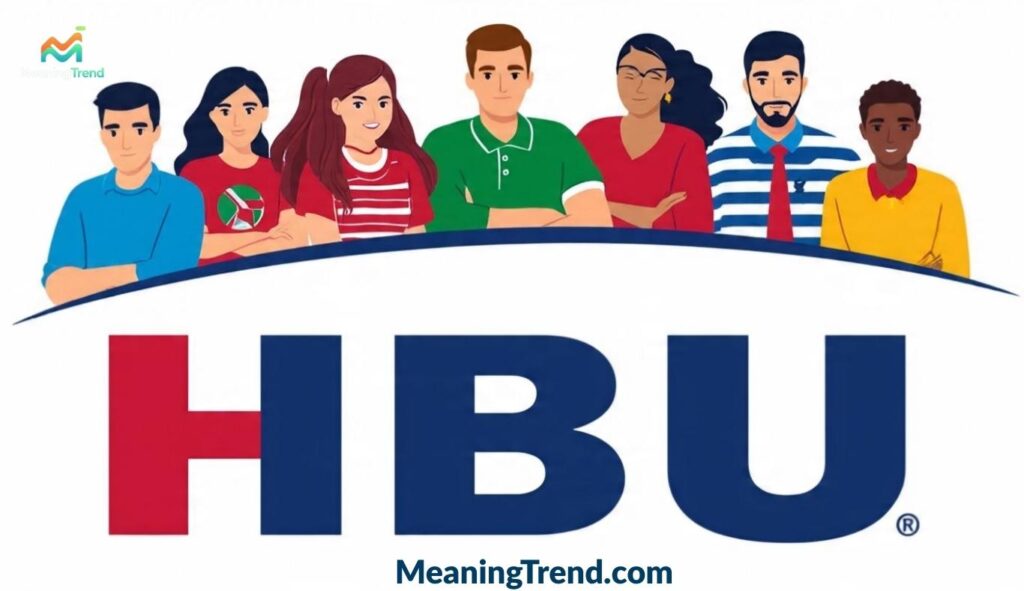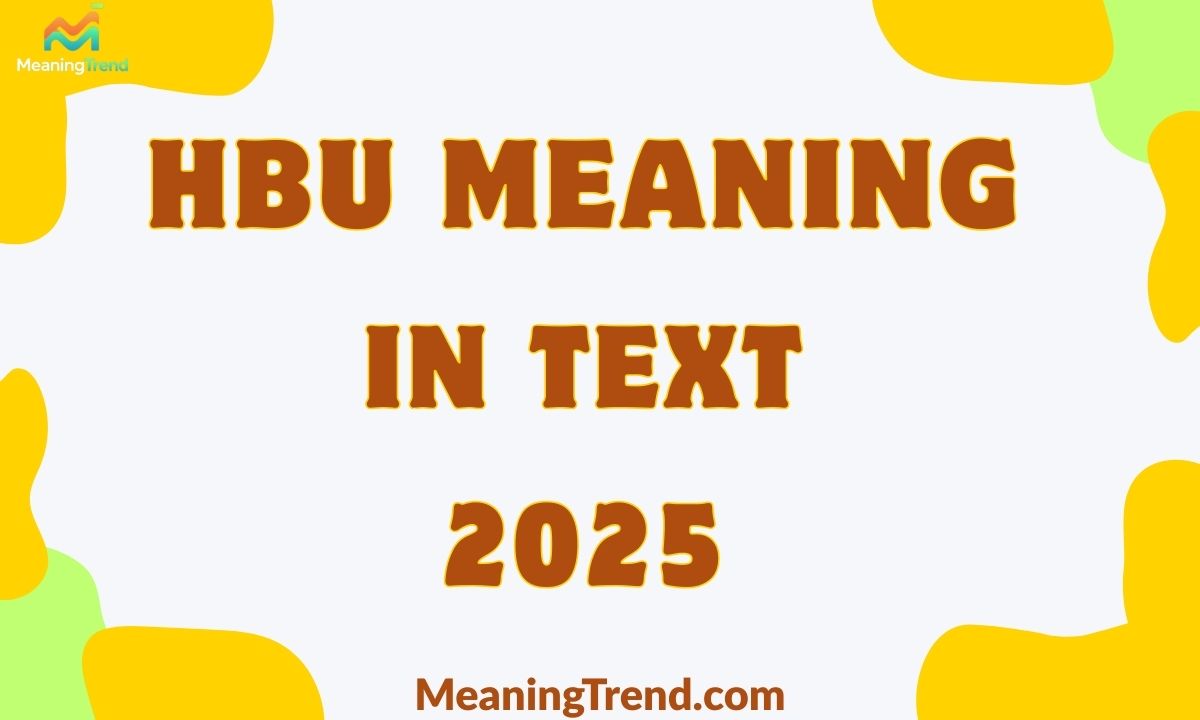If you spend time texting or chatting online, you’ve likely seen HBU appear in conversations. It’s one of those short forms that make texting quicker and easier. But if you’re not used to internet slang, you might wonder, What does HBU mean in text? Don’t worry, you’re not alone.
In this comprehensive guide, we’ll break down the HBU meaning, explore how to use it naturally, provide real-world examples, and clarify the difference between HBU vs. WBU. By the end, you’ll be proficient in using this popular texting abbreviation.
What Does HBU Mean in Text?
The abbreviation HBU stands for “How About You.” This simple yet effective acronym has become a staple in modern digital communication, allowing people to turn questions back to their conversation partners quickly.
HBU is used in casual conversations when you want to ask someone the same question they just asked you or when you want to show interest in their perspective. Instead of typing the full phrase, people simply use HBU to keep the chat short, quick, and engaging.
Example:
- A: I’m going to watch a movie tonight. HBU?
- B: I’ll just read a book and relax.
Why Do People Use HBU in Text Messages?
The primary reason people use HBU in texting is convenience and efficiency. In today’s fast-paced digital world, texting abbreviations like HBU help maintain the flow of conversation without unnecessary typing. Key benefits of using HBU include:
Time-Saving Communication
Rather than typing out “How about you?” every time, HBU gets the message across in just three letters. This is especially valuable when you’re texting on mobile devices or engaging in rapid-fire conversations.
Maintaining Conversation Flow
HBU helps keep discussions balanced and interactive. It shows you’re interested in the other person’s thoughts or experiences while keeping the chat moving smoothly.
Creating a Casual, Friendly Tone
Using HBU makes your messages feel more relaxed and approachable. It’s the digital equivalent of maintaining eye contact and showing genuine interest in face-to-face conversations.
Universal Understanding
Most people familiar with text messaging slang recognize HBU immediately, making it an effective communication tool across different age groups and social circles.
Where Can You Use HBU Appropriately?
Understanding when and where to use HBU is crucial for effective communication. This versatile abbreviation works well in various digital contexts:
Text Messages
The most common place to use HBU is in personal text conversations with friends, family members, or close acquaintances. It fits perfectly in casual exchanges about daily activities, plans, or preferences.
Social Media Platforms
HBU appears frequently in comments on Instagram, Facebook posts, Twitter replies, and TikTok interactions. It’s an excellent way to engage with others’ content while encouraging them to share their thoughts.
Messaging Apps
Whether you’re using WhatsApp, Snapchat, Messenger, Discord, or Telegram, HBU fits naturally into group chats and private conversations.
Online Gaming and Forums
In gaming communities and discussion forums, HBU helps maintain quick communication during gameplay or while participating in online discussions.
Important Note
HBU is strictly informal language. Avoid using it in professional emails, business communications, academic writing, or formal correspondence. In these contexts, always write out the complete phrase “How about you?”
Real HBU Examples in Text Conversations

Here are authentic examples showing how HBU naturally appears in everyday texting scenarios:
Casual Daily Conversations
- A: I just had an amazing pizza for dinner! HBU? B: Lucky! I just made some pasta with garlic bread.
- A: I’m so excited for this weekend’s plans! HBU? B: Same here! Can’t wait to finally relax and unwind.
- A: I definitely prefer working late at night when it’s quiet. HBU? B: I’m totally the opposite, I love getting started early in the morning.
Social Planning Examples
- A: I’m thinking about seeing that new Marvel movie tonight. HBU? B: That sounds awesome! I’ve been wanting to watch it too.
- A: I usually go to the gym around 7 AM before work. HBU? B: I prefer evening workouts, which help me de-stress after long days.
Opinion-Based Conversations
- A: I think this cold weather is actually pretty nice for a change. HBU? B: I’m not a fan – give me sunshine and warm temperatures any day!
HBU vs. WBU: Understanding the Key Differences
Many people confuse HBU with WBU, but understanding their subtle differences can improve your texting communication:
HBU = How About You WBU = What About You
While both abbreviations serve similar purposes in bouncing conversations back to the other person, they have slightly different applications:
HBU Usage: Best used when discussing preferences, feelings, opinions, or personal choices. It feels more natural when you’re exploring someone’s perspective or experience.
Examples of HBU:
- “I absolutely love Italian cuisine. HBU?” (asking about food preferences)
- “I feel really optimistic about this project. HBU?” (asking about feelings)
- “I prefer studying with background music. HBU?” (asking about study habits)
WBU Usage: More appropriate when discussing concrete situations, schedules, plans, or factual information.
Examples of WBU:
- “I’m completely free this Saturday afternoon. WBU?” (asking about availability)
- “I’m bringing chips to the party. WBU?” (asking about contributions)
- “I’m taking the 3 PM flight to Chicago. WBU?” (asking about travel plans)
Popular Text Slang Similar to HBU
Internet slang and texting abbreviations form a rich vocabulary that makes digital communication faster and more expressive. Here are other common abbreviations you’ll encounter alongside HBU:
| Abbreviation | Full Form | Usage & Meaning |
| LMK | Let Me Know | Used when you want someone to inform you about something |
| BRB | Be Right Back | Indicates you’ll return to the conversation shortly |
| IDC | I Don’t Care | Expresses indifference about a topic |
| TBH | To Be Honest | Introduces a frank or sincere statement |
| SMH | Shaking My Head | Expresses disapproval or disbelief |
| IMO | In My Opinion | Prefaces personal viewpoints |
| FYI | For Your Information | Shares relevant information |
| TTYL | Talk To You Later | Friendly way to end conversations |
Learning these common texting acronyms alongside HBU will help you navigate modern digital conversations with confidence and authenticity.
HBU on Different Social Media Platforms
HBU adapts seamlessly across various social media platforms, though its usage may vary slightly:
Snapchat
Often used in quick responses to snaps or story replies. The ephemeral nature of Snapchat makes HBU perfect for maintaining ongoing conversations without lengthy typing.
Appears frequently in DMs and comment threads, especially when responding to stories or posts about personal experiences.
Twitter/X
Used in reply threads and direct messages to encourage engagement and continue conversations within character limits.
TikTok
Common in comments when responding to creators’ questions or sharing relatable experiences.
Extensively used in both individual and group chats for casual conversation management.
Professional Communication: When NOT to Use HBU
While HBU is fantastic for casual communication, knowing when to avoid it is equally important for maintaining professional credibility:
Avoid HBU in:
- Business emails and corporate correspondence
- Job interviews or recruitment communications
- Academic papers and formal presentations
- Client communications and proposals
- Official documentation and reports
- Professional networking messages on LinkedIn
Instead, use the complete phrase: “How about you?” or more formal alternatives like “What are your thoughts on this?” or “I’d be interested to hear your perspective.”
Common Mistakes When Using HBU
Overusing HBU: While convenient, using HBU in every response can make conversations feel repetitive. Vary your responses with other engaging questions and statements.
Context Confusion: Remember that HBU specifically means “How About You.” Don’t confuse it with other abbreviations or use it when asking completely different questions.
Inappropriate Timing: Using HBU immediately after someone shares serious news or concerns can seem dismissive. Read the conversation tone before responding.
Missing Punctuation: While not always necessary, adding a question mark (HBU?) can make your intent clearer, especially in formal casual contexts.
Read More: IG Meaning in Text 2025: Quick Breakdown with Easy Examples
The Evolution of HBU in Digital Communication

Text messaging slang like HBU shows how language grows with technology. People needed faster ways to communicate as texting became popular. Simple abbreviations made conversations quicker and more fun for everyone.
HBU started in the early 2000s when phones had tiny keyboards and limited characters. Now we have better phones and unlimited texting space. But people still love using HBU because it feels friendly and creates a connection between friends.
Frequently Asked Questions
What does HBU mean in texting?
HBU simply means “How About You” in text messages. It’s a quick way to ask someone the same question or get their opinion on something you just shared.
Is HBU the same as WBU?
No, HBU means “How About You” while WBU means “What About You.” HBU is better for opinions and feelings, WBU works for plans and situations.
Can I use HBU in professional emails?
Never use HBU in work emails or formal messages. Always write “How about you?” in professional settings to maintain a respectful tone.
What does HBU mean on Snapchat and Instagram?
HBU means the same thing on all platforms – “How About You.” It’s perfect for quick replies to stories and casual conversations.
How do you reply when someone says HBU?
Simply answer their question! If they shared their plans and said HBU, tell them about your own plans or preferences naturally.
Is HBU still popular in 2024?
Yes! HBU remains one of the most popular texting abbreviations across all age groups and social media platforms today.
What’s the difference between HBU and WYD?
HBU asks for your response to their topic, while WYD (What You Doing) asks about your current activities or plans.
Should I add a question mark after HBU?
Adding HBU? with a question mark makes your intent clearer, but it’s not always necessary in casual texting conversations.
Who uses HBU most often?
Everyone from teens to adults uses HBU in casual texting. It’s especially common among people who text frequently and use social media regularly.
Are there other abbreviations similar to HBU?
Yes! Popular ones include LMK (Let Me Know), BRB (Be Right Back), TBH (To Be Honest), and IMO (In My Opinion).
Final Thoughts
Now you know everything about HBU meaning in text and how it works! This tiny word makes your conversations more fun and interactive. Start using HBU today to connect better with friends and family through texting.
Don’t keep this knowledge to yourself – share this guide with everyone you know! Help your friends discover how HBU can improve their texting game. Bookmark this page and become the texting expert everyone asks for advice!


